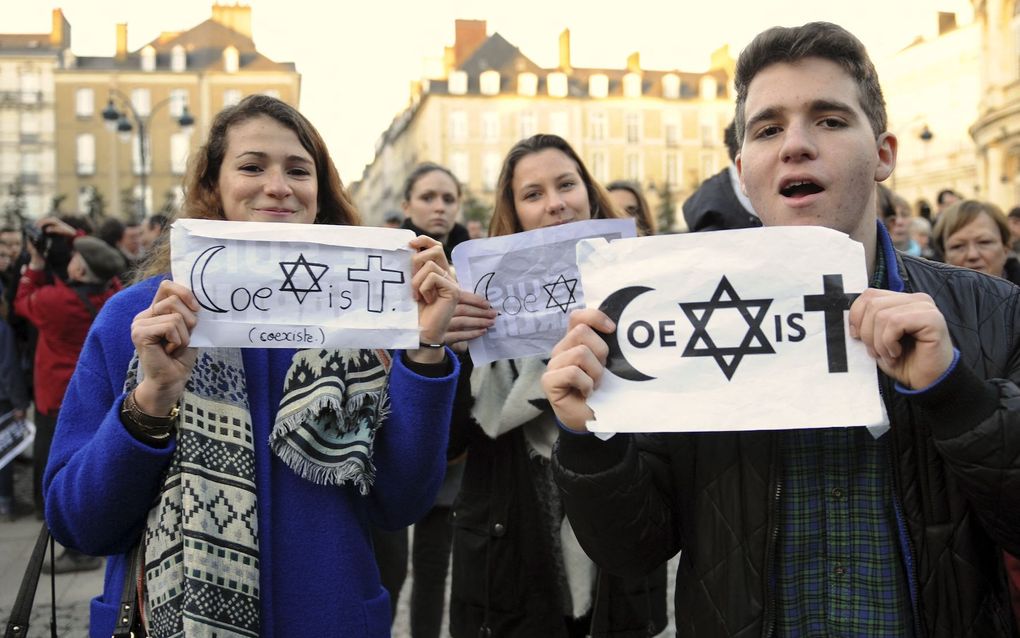Anti-Semitism leads to blank envelopes for Jewish magazines

Young activists demonstrate for coexistence after terror attacks in France, 2015. Photo AFP, Jean-Francois Monier
European Union
Recent research in seven European countries suggests that Muslims are more open to anti-Semitism than Christians, Hindus and Buddhists. Because of fear of anti-Semitism, in both Sweden and the Netherlands, Jewish magazines are distributed in a white envelope. Subscribers fear being recognised as Jews nowadays.
The Judisk krönika decided this last week, according to the Swedish daily Dagen. The chief editor, Anneli Rådestad, spoke about a “democratic problem”.

According to Rådestad, the magazine chose an anonymous cover for the first time in history. The chronicle was founded in 1932, a time of growing anti-Semitism in Europe. The Judisk krönika is published four times a year.
The white envelope is linked to the reactions after the new war between Hamas and Israel. “The Jewish Central Council did a study after October 7 that shows that 80 per cent of their members feel insecure”, says Anneli Rådestad. “When I sent out an ad on Facebook for the upcoming issue, so much hate and threats came in that it became my own reality check.”
Another reason for the decision is that the next issue is entirely about Hamas massacres of civilian Israelis.” Due to Israel’s brutal bombings in Gaza now, there is a lot of focus on those killed there, which is understandable”, says Rådestad.
According to the editor, the threat to Jews in Sweden increases every time the conflict flares up.
There are already subscribers who want their newspapers sent without a sender. But the ambition is still for the newspaper to be sent out in the usual way in the future, says Anneli Rådestad.
The Dutch magazine Nieuw Israëlitisch Weekblad decided for an anonymous cover within two weeks after the terrorist attack in October. Chief editor Esther Voet explained on television that she had actually no other choice. “People fear to receive the magazine in the letterbox.”
One of the most prominent Jews in the Netherlands, Ronny Naftaniel, criticised the magazine for this. Frightened people could read digitally, he wrote on X. “But I don’t want to be confronted with this. I am proud of being a Jew.”
Recent research shows that anti-Semitism is widespread and socially acceptable in Europe. It also appears that people from different religions in Europe have a striking different anti-Semitic posture. That is shown in the Religion Monitor 2023 from the German Bertelsmann Foundation. Muslims have higher scores than Christians.
In the Religion Monitor, between 31 and 51 per cent of those surveyed, depending on the country, agreed with the sentence: “What the state of Israel is doing with the Palestinians today is in principle not different from what the Nazis did with the Jews in the Third Reich.”
The research was done in Germany, France, Great Britain, the Netherlands, Spain, Poland and the USA among 11,000 people from 16 years and older. The survey took place this summer, before the attacks on October 7. The German magazine Pro reported about the results.
In Germany, 43 per cent agree with this statement. This is higher than the overall average of 38 per cent in the seven countries. The second anti-Semitic claim mentioned in the survey, “Jews have too much influence in our country,” was agreed by 21 per cent in Germany. All respondents agreed between 15 per cent in the Netherlands and 29 per cent in Poland.
In Germany, 4,363 people were surveyed for the survey, including 717 Muslims, whose answers were weighted according to the Muslim proportion of the total population. In the answers, the anti-Semitic thought patterns extend “well beyond the spectrum of right-wing radical parties and well into the political centre,” as the authors of the Religion Monitor explained.
According to the survey, anti-Semitism is more pronounced in the Muslim population in Germany than in the German population as a whole. Sixty-eight per cent of Muslims in Germany compare the treatment of the Palestinian people by Israeli politicians with the actions of the Nazis. And 37 per cent are convinced that Judaism has too much influence in Germany. The survey also found similarly high approval ratings among Buddhist and Hindu respondents.

According to the survey, the extent to which religion is practised has a significant influence on anti-Semitic prejudices. Muslims who are less religious agreed with the claims to a significantly lower extent than those who were highly religious. The opposite is true for the Christians surveyed: less religious people are more likely to agree with the Israel-Nazi comparison than those who are highly religious.
Related Articles









